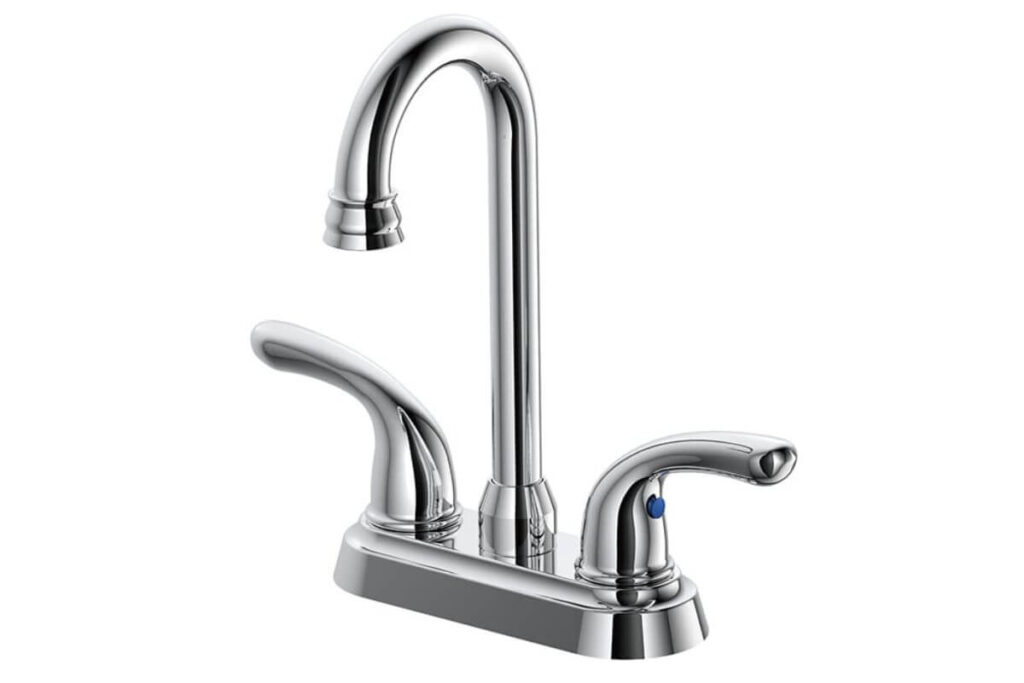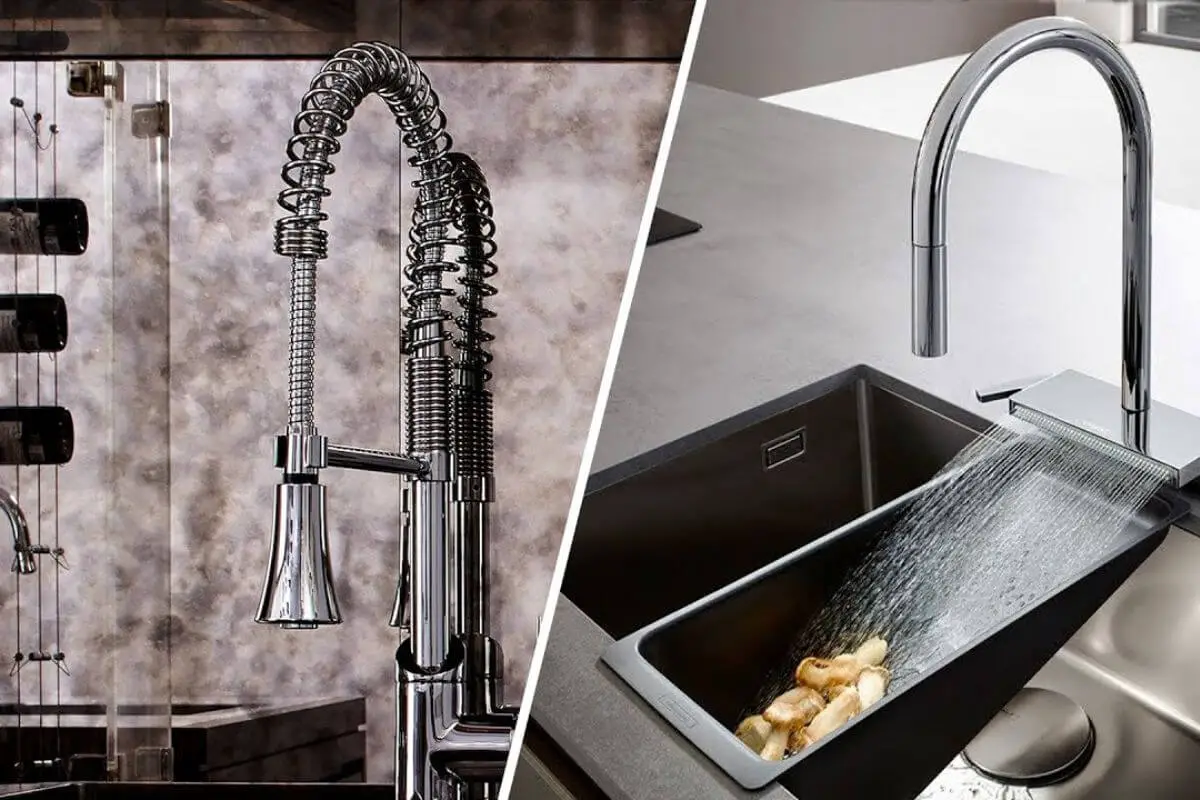When it comes to selecting a faucet for your home, you might be faced with the choice between a bar faucet and a kitchen faucet. While they may seem similar at first glance, these two types of faucets serve different purposes and have distinct features. In this article, we’ll compare bar faucets and kitchen faucets, considering their functionality, design, size, and installation, to help you make an informed decision for your specific needs.
Functionality
Bar Faucet: Compact and Practical
Bar faucets are designed for smaller sinks, typically those found in home bars, prep areas, or secondary kitchens. They are compact and have a straightforward design, making them ideal for tasks such as filling glasses, rinsing small items, and preparing beverages. Bar faucets often have a single handle for ease of use.
Kitchen Faucet: Versatile Workhorse
Kitchen faucets, on the other hand, are designed for larger sinks and provide more versatility. They come in various styles, including single-handle, double-handle, and pull-down or pull-out sprayer models. Kitchen faucets are equipped to handle a wide range of tasks, from washing dishes and pots to filling large containers and even cleaning the sink itself.
Design
Bar Faucet: Sleek and Minimalist
Bar faucets usually have a sleek and minimalist design. They are meant to complement the aesthetics of a bar or prep area without overshadowing the overall decor. They are available in various finishes to match your design preferences.

Kitchen Faucet: Diverse Styles
Kitchen faucets come in a wide range of styles to suit various kitchen designs. Whether you prefer a traditional, contemporary, or industrial look, you can find a kitchen faucet that matches your kitchen’s theme. The variety of finishes and features available makes it easier to customize your kitchen faucet to your liking.
Size
Bar Faucet: Compact and Space-Saving
Bar faucets are typically smaller in size compared to kitchen faucets. Their compact design is ideal for smaller sinks or areas where space is limited. They don’t overpower the counter space and are well-suited for tight spots.
Kitchen Faucet: Larger and More Robust
Kitchen faucets are larger and more robust to accommodate the demands of a kitchen sink. They often have longer spouts and taller profiles to reach all corners of the sink. The larger size of kitchen faucets makes them better equipped for heavy-duty tasks.
Installation
Bar Faucet: Simple Installation
Bar faucets are generally easy to install due to their smaller size and straightforward design. They typically require a single hole in the counter or sink for installation. This simplicity makes them a great DIY project for homeowners.
Kitchen Faucet: More Complex Installation
Kitchen faucets may require more complex installation, especially if they have additional features like pull-down or pull-out sprayers. They often require multiple holes in the counter or sink for different components, such as the faucet itself, handles, and sprayers. Depending on the model, professional installation may be recommended.
Conclusion
In the choice between a bar faucet and a kitchen faucet, it ultimately comes down to your specific needs and the intended use of the faucet. Bar faucets are excellent for smaller sinks and areas where simplicity and space-saving are essential. They are practical for tasks in home bars or prep areas.
Kitchen faucets, on the other hand, provide versatility and functionality for larger sinks and the demands of a full kitchen. They come in a variety of styles and offer features that can make your kitchen tasks more efficient.
Consider the size of your sink, the available counter space, your design preferences, and the tasks you’ll be performing when making your decision. Whichever option you choose, both bar faucets and kitchen faucets come in a range of styles and finishes to complement your kitchen or bar’s aesthetic.
Frequently Asked Questions
Can I use a bar faucet in my kitchen sink?
While you can use a bar faucet in a kitchen sink, it may not be the most practical choice for larger kitchen tasks. Kitchen faucets are designed to handle a wider range of functions and are better suited to the demands of a kitchen.
Are there pull-down or pull-out options for bar faucets?
Some bar faucets do come with pull-down or pull-out sprayers, but they are less common. These features can be handy for certain tasks even in a bar or prep area.
Do bar faucets have water filtration options?
Some bar faucets are compatible with water filtration systems, but the availability of this feature varies by model. Check the product specifications to see if a particular bar faucet offers filtration options.
Can I install a kitchen faucet in a bar sink?
Installing a kitchen faucet in a bar sink is possible, but you may find that the larger size of the kitchen faucet overwhelms the smaller sink. It’s important to consider the proportion and functionality of the faucet in relation to the sink size.
What are some popular finishes for both bar and kitchen faucets?
Popular finishes for both types of faucets include chrome, stainless steel, brushed nickel, and oil-rubbed bronze. The choice of finish depends on your kitchen or bar’s design and your personal style preferences.
Do bar faucets and kitchen faucets come with warranties?
Yes, both bar faucets and kitchen faucets typically come with warranties. The length and terms of the warranty may vary by manufacturer and model, so it’s essential to review the warranty information provided with your faucet.
What are the common types of handles for bar and kitchen faucets?
Bar faucets often feature single handles for simplicity and ease of use. Kitchen faucets can have single handles, double handles, or even touchless options, allowing you to choose the type that suits your preferences.
Are there eco-friendly options for both types of faucets?
Yes, both bar and kitchen faucets can be found in eco-friendly options. Look for faucets that are WaterSense certified, which means they meet water efficiency standards and help conserve water without compromising performance.
Can I install a soap dispenser with my bar or kitchen faucet?
Yes, many bar and kitchen faucets are compatible with soap dispensers that can be installed alongside the faucet. Some faucets even come with built-in soap dispensers as part of their design.
What is the typical lifespan of bar and kitchen faucets?
The lifespan of a faucet can vary depending on factors such as the quality of materials, usage, and maintenance. However, well-maintained faucets from reputable brands can last anywhere from 10 to 20 years or more.
Are there any special cleaning or maintenance requirements for these faucets?
Regular cleaning with a mild soap and water solution is usually sufficient to maintain the appearance of both bar and kitchen faucets. For hard water deposits, you can use a vinegar solution. Refer to the manufacturer’s care and maintenance instructions for specific guidance.
Can I change the style or finish of my faucet in the future?
Yes, you can replace your faucet with a different style or finish if you decide to update your kitchen or bar’s decor. Keep in mind that changing the faucet may require some adjustments to your sink or countertop, so it’s best to consult a professional plumber for installation.
Do bar and kitchen faucets require specific water pressure levels to function correctly?
While most faucets work within a typical range of water pressure, it’s essential to ensure that your home’s water pressure is within the recommended range specified by the faucet manufacturer. In some cases, you may need to install a pressure regulator if your water pressure is too high.
Can I find replacement parts for older bar and kitchen faucet models?
Replacement parts for older faucets are often available through authorized dealers or online retailers. However, the availability of parts may vary, so it’s a good idea to check with the manufacturer or a plumbing supply store for specific components.
Is it necessary to hire a professional plumber for faucet installation, or can I do it myself?
The complexity of faucet installation can vary depending on the model and your plumbing skills. While some homeowners may feel comfortable installing faucets themselves, others may prefer to hire a professional plumber to ensure proper installation and prevent potential issues.
Choosing between a bar faucet and a kitchen faucet depends on your specific requirements, so consider these FAQs to help you make the right decision for your home.



